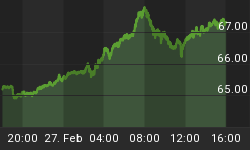Share prices have come alive in recent weeks, aided by a number of ostensibly positive developments.
Providing a big boost, of course, has been sell-off in crude oil and other commodities. To the optimists, the moves are a clear sign that the inflation bugaboo has gone away. That means the Federal Reserve can once again drop its guard and open up the monetary spigot, enabling the long-term bull market to reemerge.
Then again, maybe not.
In fact, evidence suggests that what the Fed does no longer matters. It was almost a year ago, for instance, that Bernanke & Co. began to ease policy, with fed funds having fallen by 325 basis points since then. Yet credit market conditions have worsened, 30-year mortgage rates have ticked higher and the S&P 500 has lost more than 12 percent.
So much for the power of the Fed.
Nonetheless, optimists will insist that falling prices for raw materials means that corporate America can look forward to another round of bottom lines being bolstered by fat margins. But is that likely?
Given that energy and other commodity markets have supposedly been buoyed by growth outside our shores, logic suggests that the recent sell-off in those markets indicates activity in Asia and elsewhere is softening -- just like in the U.S. If that is the case, how long will it be before gluts and competitive pressures force businesses around the globe to cut prices at a faster pace than costs are falling?
Ignoring that, some are insisting that the run-up in the dollar indicates that investors are seeing a light at the end of the tunnel for the beleaguered American economy. That means domestic consumption can pick up the slack as demand softens overseas.
But is that really why the dollar is rebounding? Or does it reflect something else? Arguably, the trigger for the recent turnaround is a sudden recognition that growth is faltering in places like Europe and Asia. In other words, currency markets are signaling that the rest of the world is poised for a bit -- or, perhaps, a lot -- of downside catch-up with a weakening U.S.
That's still not enough for some. Diehard bulls also point to the recent turnaround in the financial sector. To be sure, the one-month recovery in the shares of banks and brokers has bolstered the broader market. Indeed, given the role that financial shares played in undermining investor confidence over the past year or so, it's not surprising that some investors would view hefty gains in the financial sector as a reason for optimism.
But why are financial stocks doing better? Is it because the bad news is fully factored in? Or, as is more likely, is it due to technical factors? No matter how you slice it, it is hard to ignore the fact that the sector bottomed following a July 15th "emergency order" from the SEC barring naked short-selling in the shares of Fannie Mae, Freddie Mac and 17 large investment banks. Many of these stocks have also seen their short interest ratios drop over the span.
But starting on Wednesday, that ban is set to be lifted. And investors will have to focus, once again, on the fact that this critical sector has yet to come to grips with a surging tide of red ink and a litany of legal and other woes.
All in all, then, it seems that many of the reasons why investors have become more optimistic lately don't hold much water. In fact, it won't be long before they discover that their bullishness is -- shall I say -- all wet.















